What Foods Help Repair Kidneys? Foods To Eat & Avoid 2024
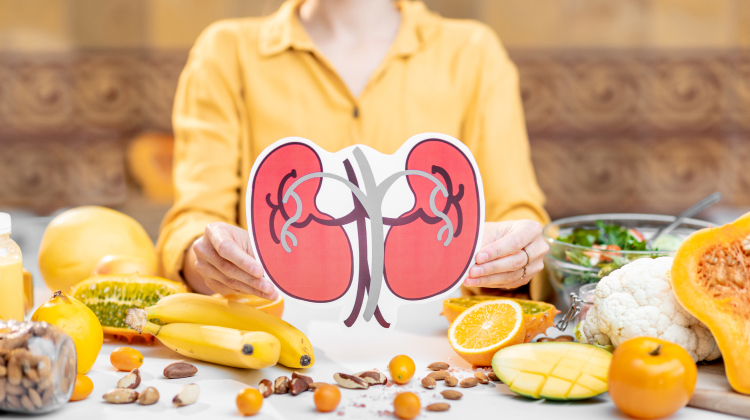
Kidney disease is on the rise[1], with chronic kidney disease diagnosed in more than 15% of Americans. That 15% is predicted to rise because of our unhealthy “Western” diet and lifestyle. So, what foods help repair kidneys?
You can repair kidneys naturally by changing your diet. Read on to discover the best foods good for kidneys – plus the foods to avoid that promote kidney damage.
10 Healthy Foods Good For Kidneys
Here are the 10 best foods for people with kidney disease.
- Garlic
- Berries
- Kale
- Rice
- Tofu
- Egg white
- Flaxseeds
- Buckwheat
- Coffee
- Olive oil
10 Healthy Foods For People With Kidney Disease
What you eat can slow kidney damage and boost kidney function, so people with kidney damage or failure need to follow a special kidney repair diet, also known as the “renal diet”[2].
Your kidneys’ job[3] is to balance fluids and filter waste products from your blood into your urine. Kidney disease means the kidneys can’t filter the blood properly anymore, leading to an imbalance of electrolytes – minerals with an electric charge – and toxic waste products in your blood.
So, the most important kidney repair foods to eat are low in the minerals that challenge an impaired kidney, e.g., sodium, potassium, and phosphorus. On the other hand, some of the most kidney-healthy foods are plant-based, such as fruits and vegetables, that lower the risk[4] of obesity, diabetes, and heart disease – the most common risk factors for kidney disease.
There are various stages of kidney disease[3] but, whatever stage you’re at, eating more of these kidney healthy foods can boost kidney function.
Garlic
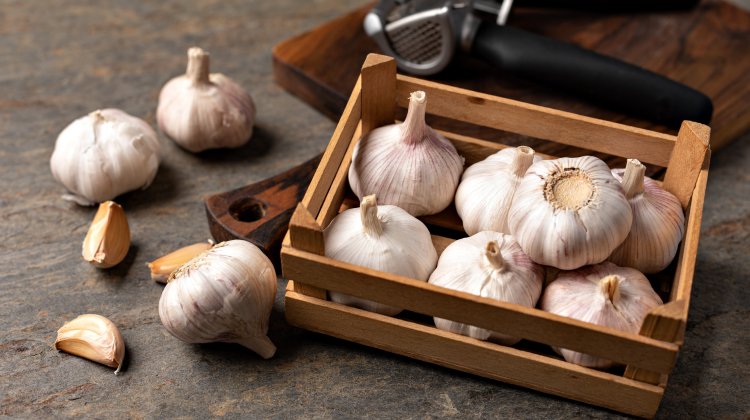
Garlic can be a good flavor replacement for salt. People with kidney disease tend to eat too much table salt[5] (i.e., sodium chloride) – even more than the recommended 2.3 g salt per day[6] (one teaspoon) recommended for healthy people (with good kidneys).
Too much salt is bad for your kidneys – the more sodium in your blood, the more work your kidneys do to filter it out. A high-sodium diet is also linked to high blood pressure, a risk factor for kidney disease; and from there, heart disease and stroke.
Eating less salt lowers blood pressure[7] in kidney disease, improves kidney function, and even improves the response to medications for kidney disease[5].
Try seasoning your food with dried garlic for some extra flavor, avoid table salt, and choose low-sodium foods.
Berries
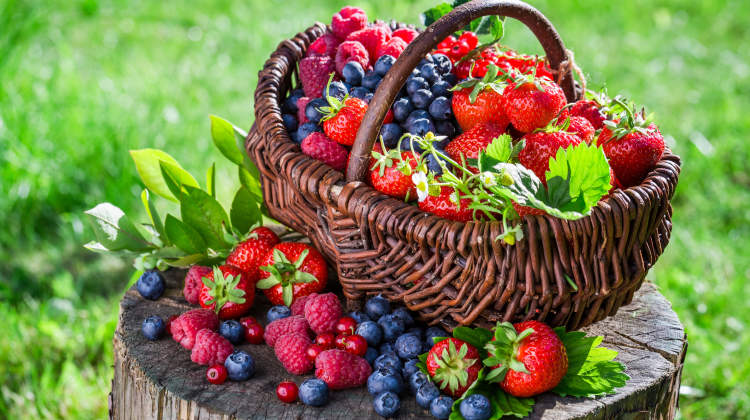
Blueberries, raspberries, strawberries, blackberries, and cherries all feature the kidney-friendly diet.
Lots of fruits (bananas, avocados, oranges, and raisins) are high in potassium, while berries are low-potassium red superfood fruits you can safely eat on a daily basis.
Berries are also a good source of anti-inflammatory and antioxidant compounds such as polyphenols[8]. These are natural plant chemicals that have lots of health benefits, including protecting us from chronic diseases that increase the risk of kidney failure.
Kale
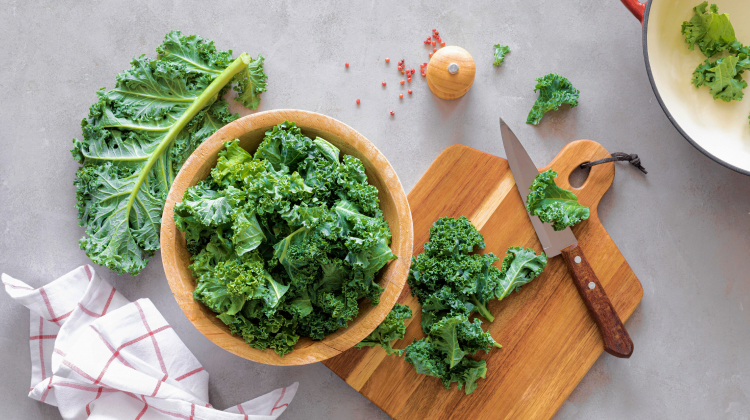
Many leafy greens are high in potassium and out of bounds if you have kidney disease.
That’s a problem because leafy greens are an important part of a balanced diet as they’re a rich source of micronutrients, fiber, and antioxidants.
Luckily, kale is a low-potassium kidney-friendly food to add to your shopping list. It’s also one of the most calcium-rich foods and is high in vitamin C, which has antioxidant and anti-inflammatory properties.
However, kale does contain some potassium, so we don’t recommend eating it raw. Boiling kale can reduce the potassium content by more than half.
- Raw kale[9]: 348 mg potassium per 100 g
- Boiled kale[10]: 144 mg potassium per 100 g
Rice
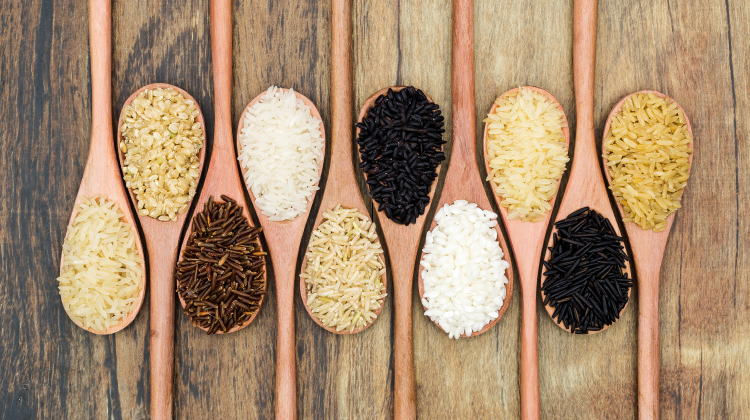
Rice is low in potassium, and brown rice is a good source of gut-healthy fiber, too. New research suggests fiber is more important for kidney health (and everything else!) than we used to think.
People with kidney disease tend to have dysbiosis[11], which is when your gut microbiome – the bacteria in your digestive tract – becomes “imbalanced.” Harmful bacteria can take up home in your gut and produce toxins, which further impact kidney health.
Conversely, a healthy gut microbiome boosts kidney function by producing protective compounds such as short-chain fatty acids. Eating more whole-grain rice can increase levels of short-chain fatty acids[12].
Tofu

The more protein you eat, the harder your kidneys have to work to filter out the phosphorus and byproducts of protein metabolism. So, in general, a kidney-friendly diet is a lower-protein diet.
However, you have to get some protein, and a great plant-based alternative to meat for those with kidney disease is tofu.
Why is plant-based better than animal-based protein? Good question. Both plant-based and animal-based proteins contain phosphorus, but the phosphorus in plant-based protein is bound up differently, as ‘phytates’[13], which humans can’t break down.
So, a plant-based diet[14] can help keep phosphate levels low while improving the gut microbiome, which consequently produces fewer kidney-damaging toxins. As some beans and lentils can be high in potassium, tofu is a great alternative.
Egg White
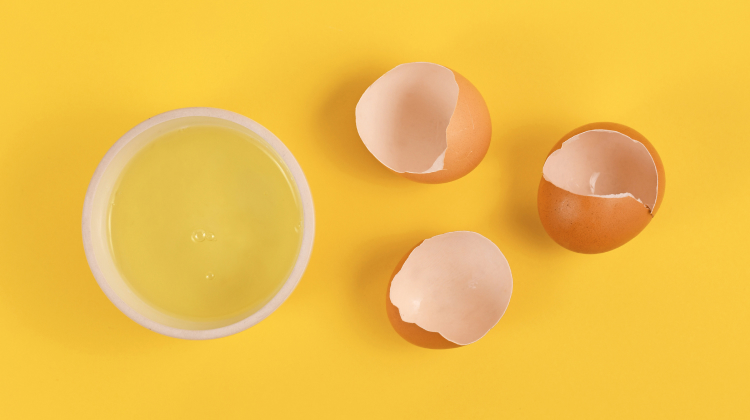
Not all animal proteins are out of bounds, though. One animal protein safe for kidney disease is egg white.
Why? Another substance that can damage kidneys is a toxin called trimethylamine N-oxide (TMAO). Our gut bacteria produce TMAO as a byproduct of breaking down substances in animal foods, such as choline and L-carnitine. Our kidneys then have to filter it out.
Studies show that red meat and egg yolks are the worst foods for increasing TMAO levels[15], while egg whites don’t increase TMAO levels. In general, vegetarians have lower levels of TMAO[16] compared to meat-eaters.
Flaxseeds
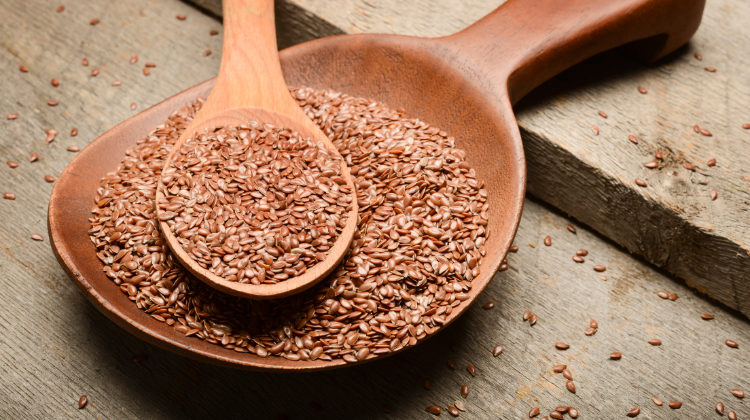
Flax, also known as linseeds, are high in healthy fats such as omega-3, which may slow the progression of kidney disease.
Supplementing omega-3 reduces the risk of end-stage renal disease[17] and lowers the risk of proteinuria, the presence of protein in the urine – a sign of kidney malfunction.
Omega-3s may also lower blood pressure, improving the function of blood vessels and reducing the risk of kidney disease patients dying from heart disease[18].
Buckwheat
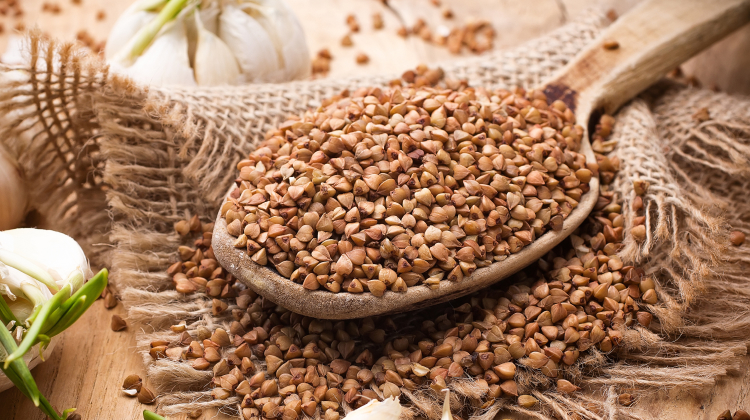
While many whole grains tend to be high in phosphorus, buckwheat is an exception. As well as being low in phosphorus, buckwheat is high in nutrients such as B vitamins, magnesium, and gut-healthy fiber.
Eating more prebiotic whole grains like buckwheat supports good gut bacteria such as Bifidobacterium[19], strengthening the gut barrier and reducing constipation risk. More efficient bowel movements mean you eliminate more urea and potassium[20], reducing the load on your kidneys.
Coffee

New research suggests your morning coffee might boost kidney health.
Studies show drinking coffee lowers kidney disease risk[21] and increases kidney filtration rate – especially in people with type 2 diabetes[22].
One metabolite of coffee[23] called “glycochenodeoxycholate” may be responsible for most of the positive impact of coffee on kidney function.
However, not all studies agree, and the positive effect of coffee on kidney health still needs to be confirmed[24]. One study suggests that the beneficial effects of drinking coffee on kidney health may be limited to women[25].
Olive Oil

Research suggests extra-virgin olive oil can improve kidney function due to the high levels of healthy fats and plant polyphenols.
In one study, consuming 40 ml of olive oil per day for nine weeks improved a range of biomarkers for kidney function[26], including filtration rate and uric acid levels, as well as lowering cholesterol and inflammation levels.
Olive oil also has anti-atherogenic effects, which can lower the risk of high blood pressure[27] and cardiovascular disease[28] – two common comorbidities with kidney disease.
Olive oil, especially “extra-virgin”[29] (which is cold-pressed and not processed), is an important constituent of the Mediterranean diet, which studies show can reduce mortality rates[30] in those with kidney disease.
Foods To Avoid
As well as eating certain foods to help repair your kidneys, you’ll also need to avoid foods that promote kidney damage.
Packaged Foods

You should avoid packaged foods, such as ready meals and savory snacks, to keep your salt intake in check. Even canned foods can have a lot of added salt.
Go for as many fresh foods as possible so you’re in control of how much salt you add.
Low-Sodium Salt
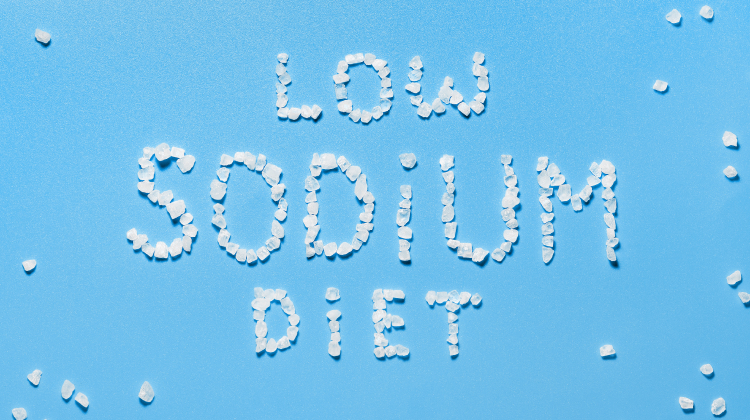
Low-sodium salt seems like a good idea for those with kidney problems, but it isn’t.
In low-sodium salt, some of the sodium is replaced with potassium, which, as we’ve learned, is just as bad for those with reduced kidney function.
High-Potassium Foods
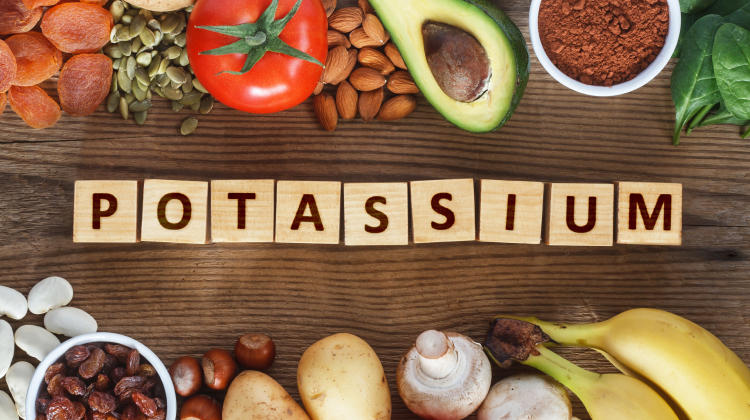
High potassium levels[31] are common in those with kidney disease because the kidneys can’t efficiently filter excess potassium into the urine.
The foods highest in potassium are
- Salmon
- Beans
- Avocado
- Potatoes
- Squash
- Milk
- Bananas and plantains
While you don’t have to avoid all high-potassium foods, make sure you keep your portions small.
Red And Processed Meat

A high-protein diet rich in animal foods may increase the risk of chronic kidney[32] disease in older adults. Red and processed meat[33] are especially problematic.
Firstly, eating too much meat increases your “acid load,” meaning your kidneys have to produce neutralizing compounds[34] and filter out the excess ammonium (a byproduct of protein metabolism).
Secondly, animal proteins are high in phosphorus, again giving your kidneys the extra task of balancing your phosphate levels.
Sugar-Sweetened Beverages

Studies suggest a link between regularly consuming drinks with added sugar[33] and kidney disease.
However, even low-sugar drinks might be bad for your kidneys. Even sugar-free colas can be problematic in those with kidney disease because they’re high in phosphate (used as a preservative)[35] and potassium.
Refined Carbohydrates
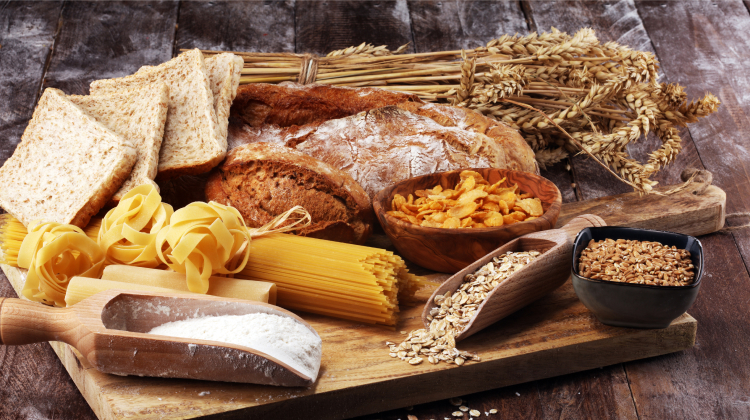
Eating too many refined, white carbohydrates such as white bread or white rice increases the risk of metabolic syndrome[36], a common risk factor for kidney disease.
The Bottom Line
Kidney disease is one of the biggest killers in the Western world – and one of the most avoidable chronic diseases. You can improve kidney function significantly with a healthy diet and lifestyle modifications.
When it comes to what foods help repair kidneys, it’s all a matter of which foods make your kidneys work harder. The best foods for your kidneys are plant-based foods. The worst foods for kidney function are meat, processed foods, and sugar-sweetened beverages.
We recommend following a plant-focused diet such as the Mediterranean diet, rich with fresh fruits and vegetables, whole grains, healthy fats, and – in moderation, of course – coffee.
+ 36 sources
Health Canal avoids using tertiary references. We have strict sourcing guidelines and rely on peer-reviewed studies, academic researches from medical associations and institutions. To ensure the accuracy of articles in Health Canal, you can read more about the editorial process here
- Kramer, H. (2019). Diet and Chronic Kidney Disease. Advances in Nutrition, [online] 10(Supplement_4), pp.S367–S379. doi:10.1093/advances/nmz011.
- American Kidney Fund. (2021). Kidney-friendly eating plan. [online] Available at: https://www.kidneyfund.org/living-kidney-disease/healthy-eating-activity/kidney-friendly-eating-plan
- Thomas, R., Kanso, A. and Sedor, J.R. (2008). Chronic Kidney Disease and Its Complications. Primary Care: Clinics in Office Practice, [online] 35(2), pp.329–344. doi:10.1016/j.pop.2008.01.008.
- Nazar, C.M.J., Bojerenu, M.M., Safdar, M., Ahmed, A., Akhtar, M.H. and Kindratt, T.B. (2015). Efficacy of dietary interventions in end-stage renal disease patients; a systematic review. Journal of nephropharmacology, [online] 5(1), pp.28–40. Available at: https://www.ncbi.nlm.nih.gov/pmc/articles/PMC5297504/
- Humalda, J.K. and Navis, G. (2014). Dietary sodium restriction. Current Opinion in Nephrology and Hypertension, [online] 23(6), pp.533–540. doi:10.1097/mnh.0000000000000073.
- Center (2022). Sodium in Your Diet. [online] U.S. Food and Drug Administration. Available at: https://www.fda.gov/food/nutrition-education-resources-materials/sodium-your-diet.
- Garofalo, C., Borrelli, S., Provenzano, M., De Stefano, T., Vita, C., Chiodini, P., Minutolo, R., Nicola, L. and Conte, G. (2018). Dietary Salt Restriction in Chronic Kidney Disease: A Meta-Analysis of Randomized Clinical Trials. Nutrients, [online] 10(6), p.732. doi:10.3390/nu10060732.
- Critical Reviews in Food Science and Nutrition. (2016). Health Benefits of Anthocyanins and Their Encapsulation for Potential Use in Food Systems: A Review. [online] Available at: https://www.tandfonline.com/doi/abs/10.1080/10408398.2013.805316
- Usda.gov. (2022). FoodData Central. [online] Available at: https://fdc.nal.usda.gov/fdc-app.html#/food-details/323505/nutrients
- Usda.gov. (2022). FoodData Central. [online] Available at: https://fdc.nal.usda.gov/fdc-app.html#/food-details/326196/nutrients
- Wehedy, E., Shatat, I.F. and Al Khodor, S. (2022). The Human Microbiome in Chronic Kidney Disease: A Double-Edged Sword. Frontiers in Medicine, [online] 8. doi:10.3389/fmed.2021.790783.
- Li, Z., Hu, G., Zhu, L., Zhao, Z., Yun Jiang, Gao, M. and Zhan, X. (2021). In vitro digestion and fecal fermentation of highly resistant starch rice and its effect on the gut microbiota. Food Chemistry, [online] 361, p.130095. doi:10.1016/j.foodchem.2021.130095.
- Fukagawa, M., Komaba, H. and Miyamoto, K. (2011). Source Matters: From Phosphorus Load to Bioavailability. Clinical Journal of the American Society of Nephrology, [online] 6(2), pp.239–240. doi:10.2215/cjn.11051210.
- Carrero, J.J., González-Ortiz, A., Avesani, C.M., Bakker, S.J.L., Bellizzi, V., Chauveau, P., Clase, C.M., Cupisti, A., Espinosa-Cuevas, A., Molina, P., Moreau, K., Piccoli, G.B., Post, A., Sezer, S. and Fouque, D. (2020). Plant-based diets to manage the risks and complications of chronic kidney disease. Nature Reviews Nephrology, [online] 16(9), pp.525–542. doi:10.1038/s41581-020-0297-2.
- Tang, W.H.W., Wang, Z., Kennedy, D.J., Wu, Y., Buffa, J.A., Agatisa-Boyle, B., Li, X.S., Levison, B.S. and Hazen, S.L. (2015). Gut Microbiota-Dependent Trimethylamine N -Oxide (TMAO) Pathway Contributes to Both Development of Renal Insufficiency and Mortality Risk in Chronic Kidney Disease. Circulation Research, [online] 116(3), pp.448–455. doi:10.1161/circresaha.116.305360.
- Koeth, R.A., Wang, Z., Levison, B.S., Buffa, J.A., Org, E., Sheehy, B.T., Britt, E.B., Fu, X., Wu, Y., Li, L., Smith, J.D., DiDonato, J.A., Chen, J., Li, H., Wu, G.D., Lewis, J.D., Warrier, M., Brown, J.M., Krauss, R.M. and Tang, W.H.W. (2013). Intestinal microbiota metabolism of l-carnitine, a nutrient in red meat, promotes atherosclerosis. Nature Medicine, [online] 19(5), pp.576–585. doi:10.1038/nm.3145.
- Hu, J., Liu, Z. and Zhang, H. (2017). Omega-3 fatty acid supplementation as an adjunctive therapy in the treatment of chronic kidney disease: a meta-analysis. Clinics, [online] 72(1), pp.58–64. doi:10.6061/clinics/2017(01)10.
- Saglimbene, V.M., Wong, G., van Zwieten, A., Palmer, S.C., Ruospo, M., Natale, P., Campbell, K., Teixeira-Pinto, A., Craig, J.C. and Strippoli, G.F.M. (2020). Effects of omega-3 polyunsaturated fatty acid intake in patients with chronic kidney disease: Systematic review and meta-analysis of randomized controlled trials. Clinical Nutrition, [online] 39(2), pp.358–368. doi:10.1016/j.clnu.2019.02.041.
- Langlands, S.J. (2004). Prebiotic carbohydrates modify the mucosa associated microflora of the human large bowel. Gut, [online] 53(11), pp.1610–1616. doi:10.1136/gut.2003.037580.
- Nutritional Management of Chronic Kidney Disease. (2018). New England Journal of Medicine, [online] 378(6), pp.583–585. doi:10.1056/nejmc1715765.
- Kennedy, O.J., Pirastu, N., Poole, R., Fallowfield, J.A., Hayes, P.C., Grzeszkowiak, E.J., Taal, M.W., Wilson, J.F., Parkes, J. and Roderick, P.J. (2020). Coffee Consumption and Kidney Function: A Mendelian Randomization Study. American Journal of Kidney Diseases, [online] 75(5), pp.753–761. doi:10.1053/j.ajkd.2019.08.025.
- Komorita, Y., Ohkuma, T., Iwase, M., Fujii, H., Ide, H., Oku, Y., Higashi, T., Oshiro, A., Sakamoto, W., Yoshinari, M., Nakamura, U. and Kitazono, T. (2022). Relationship of coffee consumption with a decline in kidney function among patients with type 2 diabetes: The Fukuoka Diabetes Registry. Journal of Diabetes Investigation, [online] 13(6), pp.1030–1038. doi:10.1111/jdi.13769.
- He, W.J., Chen, J., Razavi, A.C., Hu, E.A., Grams, M.E., Yu, B., Parikh, C.R., Boerwinkle, E., Bazzano, L., Qi, L., Kelly, T.N., Coresh, J. and Rebholz, C.M. (2021). Metabolites Associated with Coffee Consumption and Incident Chronic Kidney Disease. Clinical Journal of the American Society of Nephrology, [online] 16(11), pp.1620–1629. doi:10.2215/cjn.05520421.
- Mazidi, M., Dehghan, A., Mikhailidis, D., Jóźwiak, J., Covic, A., Sattar, N., Banach, M., Lipid and Blood Pressure Meta-analysis Collab and ILEP), and the I.L.E.P. (2021). The Association between Coffee and Caffeine Consumption and Renal Function: Insight from Individual-Level Data, Mendelian Randomization, and Meta-Analysis. Archives of Medical Science. [online] doi:10.5114/aoms/144905.
- Wijarnpreecha, K., Thongprayoon, C., Thamcharoen, N., Panjawatanan, P. and Cheungpasitporn, W. (2016). Association of coffee consumption and chronic kidney disease: A meta-analysis. International Journal of Clinical Practice, [online] 71(1), p.e12919. doi:10.1111/ijcp.12919.
- Noce, A., Marrone, G., Urciuoli, S., Di Daniele, F., Di Lauro, M., Pietroboni Zaitseva, A., Di Daniele, N. and Romani, A. (2021). Usefulness of Extra Virgin Olive Oil Minor Polar Compounds in the Management of Chronic Kidney Disease Patients. Nutrients, [online] 13(2), p.581. doi:10.3390/nu13020581.
- Pozzetti, L., Ferrara, F., Marotta, L., Gemma, S., Butini, S., Benedusi, M., Fusi, F., Ahmed, A., Pomponi, S., Ferrari, S., Perini, M., Ramunno, A., Pepe, G., Campiglia, P., Valacchi, G., Carullo, G. and Campiani, G. (2022). Extra Virgin Olive Oil Extracts of Indigenous Southern Tuscany Cultivar Act as Anti-Inflammatory and Vasorelaxant Nutraceuticals. Antioxidants, [online] 11(3), p.437. doi:10.3390/antiox11030437.
- Silva, S., Bronze, M.R., Figueira, M.E., Siwy, J., Mischak, H., Combet, E. and Mullen, W. (2014). Impact of a 6-wk olive oil supplementation in healthy adults on urinary proteomic biomarkers of coronary artery disease, chronic kidney disease, and diabetes (types 1 and 2): a randomized, parallel, controlled, double-blind study. The American Journal of Clinical Nutrition, [online] 101(1), pp.44–54. doi:10.3945/ajcn.114.094219.
- LeWine, H.E. (2021). Is extra-virgin olive oil extra healthy? – Harvard Health. [online] Harvard Health. Available at: https://www.health.harvard.edu/nutrition/is-extra-virgin-olive-oil-extra-healthy
- Rysz, J., Franczyk, B., Ciałkowska-Rysz, A. and Gluba-Brzózka, A. (2017). The Effect of Diet on the Survival of Patients with Chronic Kidney Disease. Nutrients, [online] 9(5), p.495. doi:10.3390/nu9050495.
- Kovesdy, C.P. (2014). Management of hyperkalaemia in chronic kidney disease. Nature Reviews Nephrology, [online] 10(11), pp.653–662. doi:10.1038/nrneph.2014.168.
- Kwon, Y.-J., Park, K. and Lee, J.-H. (2022). Low-protein diet is inversely related to the incidence of chronic kidney disease in middle-aged and older adults: results from a community-based prospective cohort study. European Journal of Nutrition, [online] 61(7), pp.3795–3807. doi:10.1007/s00394-022-02981-1.
- van Westing, A.C., Küpers, L.K. and Geleijnse, J.M. (2020). Diet and Kidney Function: a Literature Review. Current Hypertension Reports, [online] 22(2). doi:10.1007/s11906-020-1020-1.
- Scialla, J.J. and Anderson, C.A.M. (2013). Dietary Acid Load: A Novel Nutritional Target in Chronic Kidney Disease? Advances in Chronic Kidney Disease, [online] 20(2), pp.141–149. doi:10.1053/j.ackd.2012.11.001.
- Savica, V., Bellinghieri, G. and Calò, L.A. (2009). Association of Serum Phosphorus Concentration With Cardiovascular Risk. American Journal of Kidney Diseases, [online] 54(2), p.389. doi:10.1053/j.ajkd.2009.05.020.
- Clemente-Suárez, V.J., Mielgo-Ayuso, J., Martín-Rodríguez, A., Ramos-Campo, D.J., Redondo-Flórez, L. and Tornero-Aguilera, J.F. (2022). The Burden of Carbohydrates in Health and Disease. Nutrients, [online] 14(18), p.3809. doi:10.3390/nu14183809.



